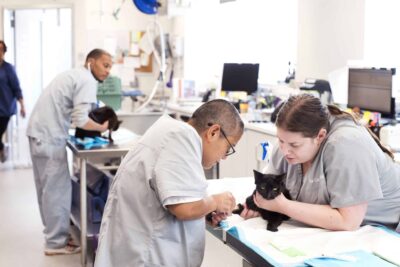Pet Cancer Awareness Month 2023: All About Chemotherapy Drugs

Pet Cancer Awareness Month 2023: All About Chemotherapy Drugs
When I see a new client in the clinic to discuss chemotherapy for their favorite fur-person, the conversation can be long and stressful. We need to cover treatment options, treatment schedule, outcomes, side effects and quality of life. I recently had this conversation with a new client, who stopped me and asked, “What exactly are chemotherapy drugs?” It’s a fair question but not one I’ve had to answer before, surprisingly. Keep reading for my answer.
Traditional Chemotherapy Drugs for Veterinary Patients
Nitrogen Mustard
One of the first chemotherapy drugs to be used on human patients was nitrogen mustard. During World War II, sailors exposed to weaponized mustard gas were noted to have lymph nodes without lymphocytes. This led to nitrogen mustard as a treatment for lymphoma (lymph node cancer).
Several of the chemotherapy drugs we commonly administer to treat lymphoma in dogs and cats are structurally modified versions of nitrogen mustard. This list includes cyclophosphamide, melphalan, lomustine and chlorambucil.
Plant- and Bacteria-Based Chemotherapy Drugs
Another group of traditional chemotherapy drugs are extracted from plants or bacteria. You might even have one of these plants in your garden as ground cover: periwinkle, from which we get the chemotherapy drugs vincristine and vinblastine. Meanwhile, the antitumor antibiotic chemotherapy drugs, doxorubicin and bleomycin come from a bacteria known as Streptomyces.
Chemotherapy Drugs that Block Cellular Reproduction
A third group of traditional chemotherapy drugs mimic the building blocks of DNA and “sneak” into the cancer cells’ genetic code to disrupt their reproduction. Drugs in this group of chemotherapy agents used by veterinarians include cytosine arabinoside and 5 fluorouracil.
The mechanism of action is similar in all three of the above groups of traditional chemotherapy drugs. These drugs kill rapidly dividing cancer cells by damaging or inactivating the cell’s genetic material, preventing cells from reproducing.
Targeted Chemotherapy Drugs
Targeted therapy is the newcomer on the chemotherapy drug block for both animal and human cancers. These drugs “target” an Achilles heel in the tumor, whether it’s a gene, protein or other growth factor. This is in contrast to traditional chemotherapy drugs, which are not tumor-specific. In short, targeted chemotherapy drugs “turn off” cancer growth. Toceranib phosphate is a targeted chemotherapy drug for mast cell tumors, the first chemotherapy drug approved specifically for dogs.
Prednisone/Prednisolone
The drug class known as glucocorticoids include prednisone and prednisolone. Colloquially, these drugs are known as steroids. Steroids have anticancer properties but only in a limited number of cancer types. This fact explains why I prescribe prednisone/prednisolone for lymphoma and plasma cell tumors but not for lung cancer or hemangiosarcoma.
In lymphoma and plasma cell tumors, prednisone/prednisolone causes cancer cell death and, in some patients, can induce remission of the cancer.
Pet Cancer Awareness Month
November is National Pet Cancer Awareness Month, and this blog post will be the first of a series discussing cancer and cancer treatment in pets. Stay tuned for more oncology information next week.
If you would like to support cancer care for animals need, please consider a donation to AMC’s Buddy Fund.

































